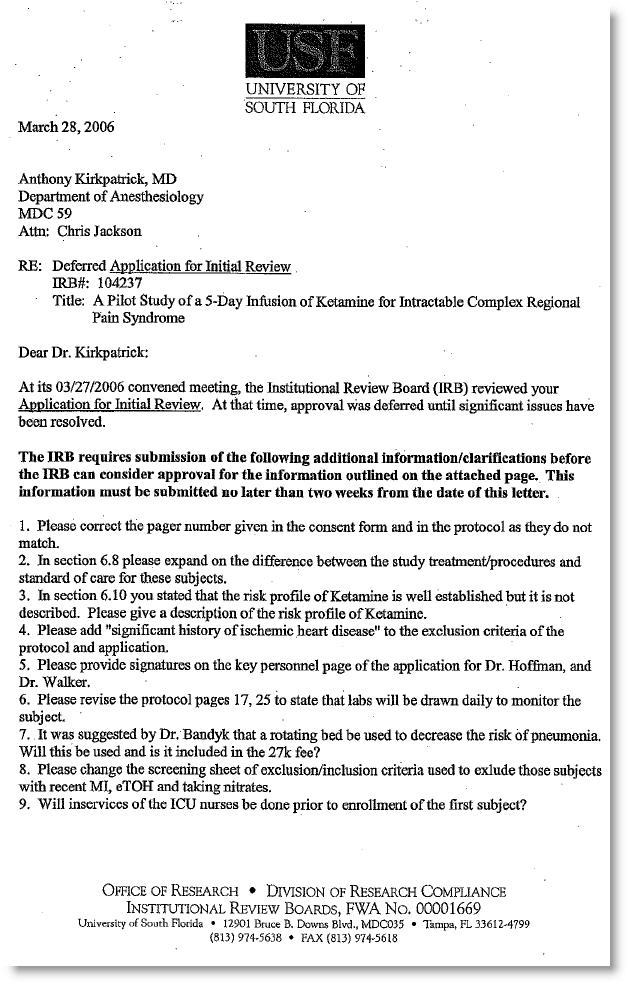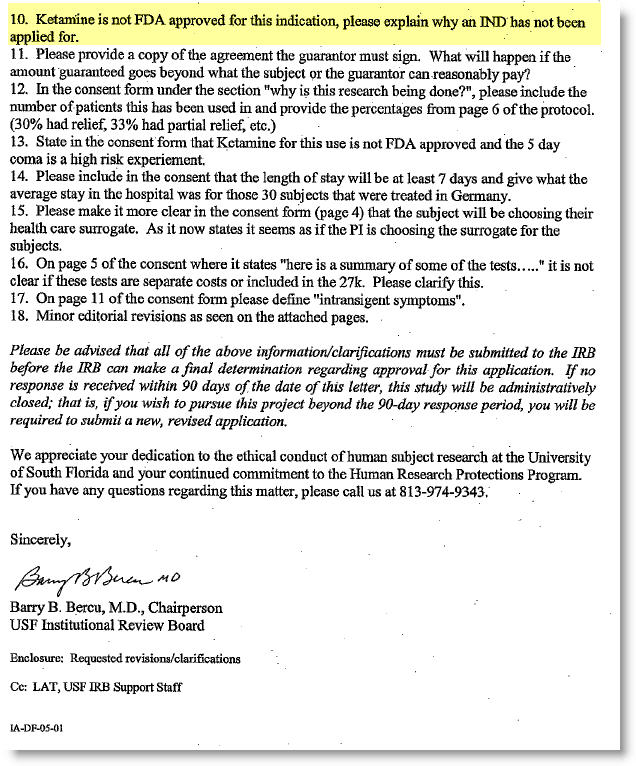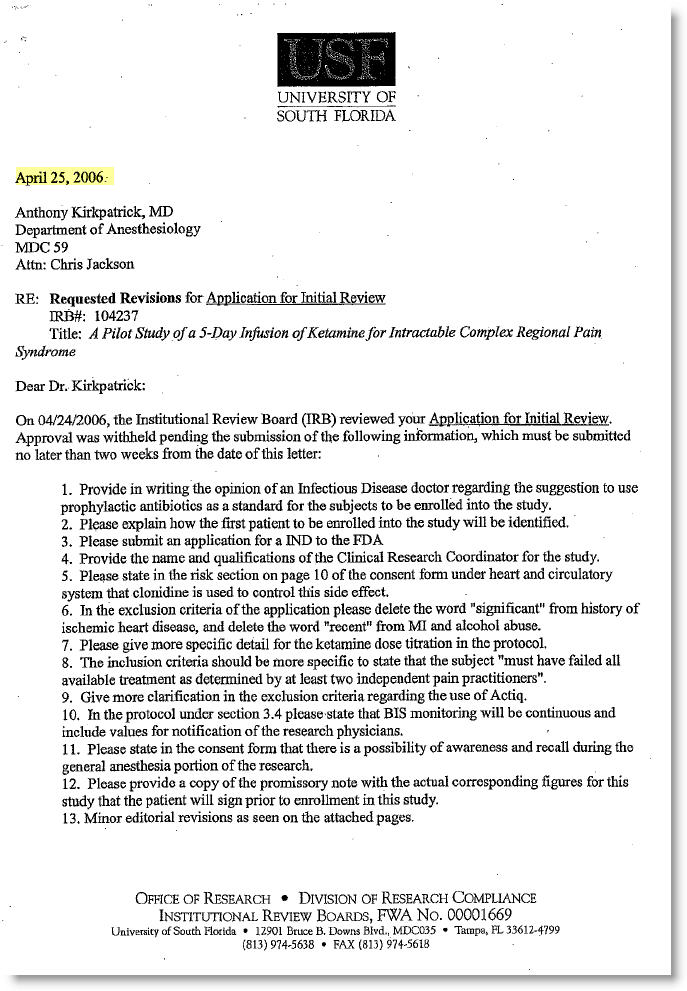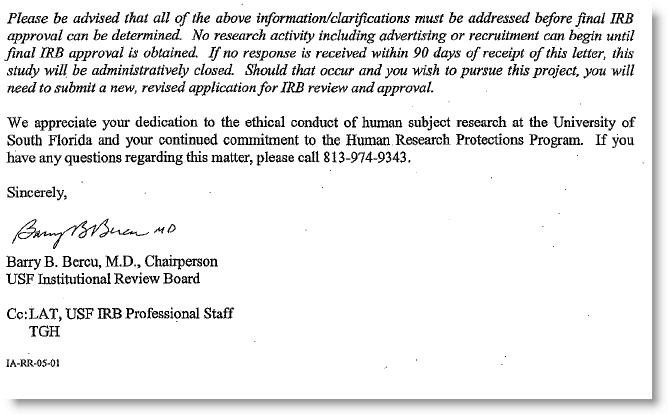IRB University of South Florida 3500 East Fletcher Avenue, Suite 300 December 19, 2005 IRB MEETING MINUTES The Chair, Dr. Bercu, called the Institutional Review meeting to order on December 19, 2005 at 2:30 p.m. Members present: Barry Bercu, M.D., Chairperson, University of South Florida, Pediatrics Kenneth Berg, B.S., Non-Affiliated, Non-scientist, Community member Mortimer Brown, Ph.D., Non-Affiliated Cathie DeLuna, R.N., Tampa General Hospital, Nursing Linda Detman, Ph.D., USF Clement Gwede, Ph.D., MPH, R.N., USF/Moffitt Cancer Center, Nursing/Health Outcomes Pamela Munster, M.D., USF, MCC, Medical Oncology Jennifer Powe, RN, VA, Cardiothoracic Patti Simmons, Manager, Research and Sponsored Projects, TGH, Ex-Officio Members absent: Ray Dielman, N.D., NA, Radiation Medicine, Natural Hygiene Hiram Green, B.A. USF Non-scientist, Diversity/Community Affairs Adriana Hung, M.D., VA, Nephrology Nagi Kumar, Ph.D., USF, MCC, Nutrition Richard Lush, Ph.D., USF, MCC, Pharmacology/therapeutics John Merritt, M.D. FACP, USF, VA, Internal Medicine Daniel Sullivan, M.D. USF, MCC, Medical oncology/biochemistry Administrative Staff: Laurie A. Tozier, Sr. Grants Specialist Henry Zych, IRB Coordinator Guests: Lorraine Hickson, MCC, Anthony Kirkpatrick, MD The IRB chair stated before the board that no member may participate in the review, discussion or vote of a project or activity in which she/he has a conflicting interest. The IRB member must leave the room prior to discussion, review and vote of the project and cannot be counted towards the quorum. The excused member can be recalled to provide information that is requested by the IRB.
New Protocol 104237 Kirkpatrick, Anthony A Pilot Study of a 5-Day Infusion of Ketamine for Intractable Complex Regional Pain Syndrome The PI came to the meeting to present the study to the board. The study is looking at what is called complex regional pain syndrome or CRPS which is characterized by a lot of ups and downs in pain levels leaving the determination of efficacy a problem. Usually the pain does not go away completely and patients experience chronic pain which lingers after some treatments. Patients are only provided temporary relief of pain. The PI stated that his practice has now been limited to this CRPS patient population from all over the world and treats those with the most serious/worse cases where the syndrome has spread to multiple extremities, is progressing rapidly and other treatments have failed. The treatments currently given include medications, synthetic nerve blocks, sometimes amputhecotmy if appropriate, spinal cord stimulation, surgeries, implanting devices and invasive procedures to provide some measure of relief. A national scientific advisory committee was created to set up the first clinical practice guidelines for the diagnosis and treatment of RSD that is now used by the Social Security Administration of adjudicated cases involving this syndrome. The cases seen by the PI have basically run out of options for treatment. The patients that have gone overseas to have this treatment were basically flat on their backs and have gone through all the invasive interventions. The PI stated that when these patients returned they were literally changed people. After the high dose treatment some patients sometimes also need to be given a booster of low dose ketamine. The PIs goal is to take this treatment out of Germany, bring it here, treat this population and find ways to improve the safety, comfort and tolerability factor for these subjects and hopefully generate enough data to serve as a stepping stone to a controlled study with an active control. The issues to be dealt with by the PI from an ethical standpoint is the cost of this study and treatment. The patients that have gone to Germany so far have spent more than 30k. The plan is to try to get some funding to help these patients with the costs involved. The PI will be communicating with Travelers Insurance and St. Pauls to solicit some funds. The costs are estimated with no complications for 5 days of infusion and 2 days of recovery in the hospital for a total of 27k, and this does not include any consults that could occur during the stay outside of the hospital expenses. The board asked if any of these patients have been treated with the low dose of ketamine. The PIs response was that he had just read the manuscript for 4 patients that were put on the low dose (and noted that the board keep in mind these patients are basically debilitated and flat on their backs) of 100 mg per hour and the study is using 3-4 times higher doses. When the subjects were given this dosage for 10 days the pain comes back. There is something about the higher dose intervention for 5 days that works. The hypothesis is basically an overload of the receptors. The PI also stated that before a patient is enrolled into the study he will contact their insurance company and explain what treatments have been done to date and what he proposes and will request them to cover the treatment or at least part of it. The low dose boosters are being covered by the insurance companies at this time. A board member stated that ketamine has been used in other settings for long periods of time and asked the PI to comment on this. His response states that there have been studies done where subjects with severe head trauma received long term anesthesia for more than 5 days with ketamine. The advantage of ketamine is that it supports blood pressure and gives better GI function than with opioids. What was found was that blood pressure was maintained in these patients and was a statistically significant advantage over using narcotics in these head injury patients. Most anesthesiologists generally stay away from ketamine for head injury patients because of the increase in intracranial pressure but in that study it was not a problem. Another comment of the board was that there will be a group of people that will not be able to come up with the initial 27k making this option not available to everyone. It was also noted that the investigators involved will be waiving their fees for the study to help reduce cost. The PI also stated that there will be special in-services for these patients and continuous monitoring and oversight. He also stated he would be accessible 24 hours a day by phone, and/or pager. The patients may end up staying in the hospital for more than 7 days especially if the disease is in the lower extremities as it may take longer to get up and get around walking and moving as they will be weak but the PI will have them doing exercises such as using a pool to regain their strength. The PI noted that he would also like to make a change to the protocol at this time. He would like to only perform the neuropsychological testing at 3 and 6 months for the study instead of at every visit as currently stated in the protocol. The board agreed to this change. [Tape #1, side A, 28 minutes] Dr. Kirkpatrick leaves the meeting. Discussion of the board. A board member stated that the charges are not clearly defined. The TGH representative stated that when the study was reviewed at TGH they were asked to consider the rates comparable to current Medicade rates but TGH denied this because they would lose money. Because of the time needed in the ICU and the days on the surgical floor it will be a high cost study for a patient with no complications. The risks of complications in this patient population is very high and will add to the cost of their overall care and extend their hospital stay. Based on the financial projections for the 7 days not including the consult fees it was determined the best option was 27k and an additional 35% of gross charges that exceed 70k. The hospital has no control over the consultation and other outside fees. The Board requested that perhaps the PI can provide the IRB with some numbers of the costs that are involved after the first patient is treated. It was stated that many of these patient do not have insurance because they are unable to keep health coverage and do not qualify for medicade either but, fall into a category where they cannot get Financial help and do not have the funds to pay. The primary reviewer stated that the background was heard from the PI and these patients have very few options available to them. The reviewer stated that the most challenging aspect of the study is the cost issue. The procedure is being done elsewhere and there is some experience with the long term anesthesia. The issues noted were that the protocol did not state what the prevalence is of this problem, and should be added to the background. The reviewer agreed with the staff comments and revisions. The application changes needed include the number of subjects. It should be stated as I subject, then re-review, then 3 subjects and DSMB review, and then 7 subjects and so on. The ethnic origin/population needs to be at least estimated in section 7C. The application and protocol are not consistent with each other and they need to change that. The IND section is appropriate in the application. Section 16.1 and 16.2 has missing information that can be found in the protocol. In the consent form the PI may want to include more of the key people to the first page of the consent form. There should be more information added to the section of why the study is being done. The cost section needs to be much more specific about the charges that could be involved while in the hospital. [Tape #1, side A, 38 minutes, Tape ends] [Tape #1, side B, Tape begins] The secondary reviewer stated their concerns. The consent form should state that this procedure does not help all patients and that the pain can return. The percentage of the risks should be included in the consent. The information gathered from the study in Germany should be included. (Ten subjects received this treatment in Germany and 7 are free from pain, etc). All the risks of all the procedures being done in the study need to be included in the consent. The washout period should also be described in the consent and application. Also, if these subjects are on chronic narcotics for pain control can they truly sign informed consent. The risks of the ketamine versed should also be explained in the consent form. The reviewer noted that there is an abstract but this study has not been published. It was stated that ketamine is a PCP derivative and wondered if it can be addictive and will the subjects need to keep getting boosters because of this. The exclusion criteria should include anyone on a nitrate because of chronic ischemia. The labs involved should be done everyday during the study. It is mentioned in several places that they will be done every other day but need to be done everyday. Another board member wanted to know what happens if the costs become so high the subject cannot pay the charges. These patients will lose their homes and the potential to lose everything for a chance to be pain free. Also noted is that all four of the members of the DSMB are on the protocol. There should be an independent review of this study by an independent board or group of people with no one from the study involved. It was stated that all the data collected after the first subject has completed the study will be reviewed by TGH and the IRB before another subject can be treated. The risk is greater than minimal risk with the potential of benefit to the subject. A board member noted that the beneficence of this study is not quite clear. These subjects are in tremendous pain and under the influence of narcotics so are they in the right frame of mind to be consented and understand the ramifications of this protocol. Secondly, what about justice of these patients, only those that have money can be in the study or those without money? Choosing is not providing justice. The PI should try to find a sponsor for this study. The hospital should not be expected to swallow the costs of this study and it is very likely these patients will spend more than 7 days in the hospital. The costs are too vaguely defined when it is very possible this could cost half a million dollars. The dilemma is that any PI cannot get a sponsor without data to present. The study in Germany has not even been published and they are basing everything on the study in Germany. The board asked that the data collected from the German study be reviewed. It was suggested that perhaps the PI could be more definitive in his exclusion criteria to help reduce the potential risks while in the hospital. The majority of the board did not agree with that suggestion. Again if some independent anesthesiologists could review this study it could give another point of view. The board wanted to know why this study has not been done in Philadelphia where the booster doses are given. The reviewer asked for the data from the German experiment and what was the criteria for selecting those patients and what are the characteristics of those patients previously treated. Dr. Kirkpatrick entered the meeting again. The question raised to the PI was why this study is not being done in Philadelphia. The PI response states that Dr. Swartzman has a lot of protocols going on presently. He is conducting the low dose study and simply cannot do it due to time.
A board member asked about the Orphan drug Act that was mentioned in the study and the PI stated he has not contacted them yet for funding. The board told the PI that they will want the data from the study done in Germany. The PI will provide a copy of the 4 patients with severe RSD that went on the low dose regimen. The pain these patients experience is a subjective and the way it is measured is more by performance such as daily performance of walking or returning to work. Overall, this study presents a very significant ethical dilemma for the IRB and has been the most difficult protocol that has been reviewed to date by this Board. The Board also requested that an outside review be done by independent persons. A motion was made to withhold approval (defer) of the study pending submission of substantive changes. The motion was seconded and carried unanimously. The IRB voted For - 8 Against - 0 Abstain - 0 (Total present - 8) Tape #1, side B, 47 min, Tape ends] | 








